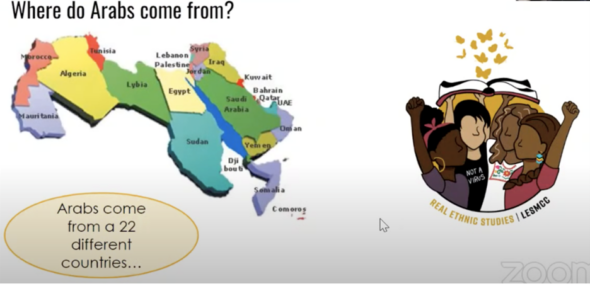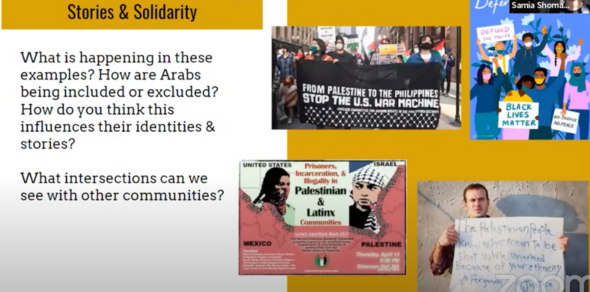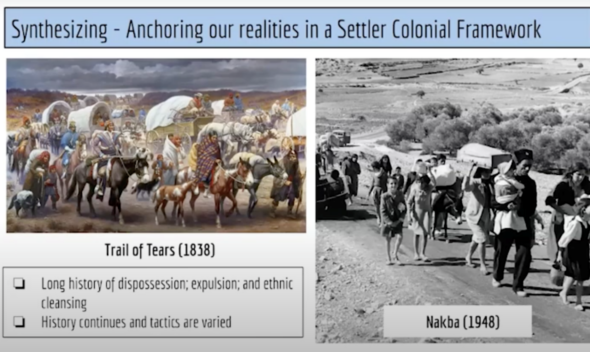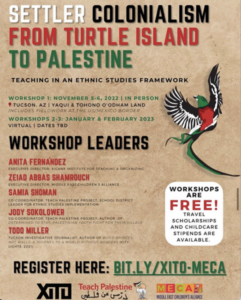American educators have long taught about the history, accomplishments and struggles of ethnic groups under the rubric of multicultural education. In this process, the American mosaic is presented as complex, hopeful, and as reinforcing the national credo, “E Pluribus Unum” (Out of many, one).
Now, a nationwide movement called liberated ethnic studies seeks to introduce a divisive politicized project into the nation’s K-12 curriculum that disavows this central tenet of education fostering national unity and cohesion. The movement’s teacher-activists aim to indoctrinate teachers, encouraging them to enlist students into an effort they claim is necessary to address systemic racism in America.
Many of the leaders of the liberated ethnic studies movement also profess their allegiance to anti-Israel activism and have shaped the movement’s content and direction sharply towards their views.
This report, the first of a series, includes information provided by attendees at educator workshops and webinars conducted by liberated ethnic studies organizers. It documents how teachers are targeted for indoctrination into an ideology that employs one-sided narratives, false information, and pejoratives in order to cast Jews, Zionism and the state of Israel as enemies of progress and oppressors. Prominent consultants associated with liberated ethnic studies are Boycott, Divestment and Sanctions (BDS) advocates (and here, here, here and here) whose purpose is to inject anti-Israel propaganda into American schools at all grade levels.
The aim in exposing these efforts is to alert the public, including parents, educators, school board members, school administrators and state-level policy makers, about the biased and inaccurate anti-Israel materials being aggressively promoted into America’s primary and secondary school classrooms.
Liberated Ethnic Studies Moves Into K-12 Education
It is important to understand that the expansion of ethnic studies curricula, distinct from accounts of ethnic groups woven into conventional history curricula, is a relatively recent occurrence. Established academic fields have vetted and approved standards. These do not exist for ethnic studies. The absence of rigorous standards leaves ethnic studies curricula subject to myriad potential abuses and provides ample opportunity for political activists intent on injecting their personal biases and political agenda into a brand-new market – America’s schools.
The recent push to insert liberated ethnic studies into American classrooms went public in 2019 in California. There, the California State Board of Education had been charged by the legislature with crafting an ethnic studies model curriculum. The Board selected liberated ethnic studies proponents to serve on this project’s advisory committee and the resulting draft triggered widespread controversy, in large part due to its anti-Jewish and anti-Israel content. National media coverage and an outpouring of negative public comments caused the California Department of Education to pivot, discarding that first draft. A substantially revised version was approved by the state’s Board of Education in March 2021.
That same year, California Governor Newsom signed into law a requirement that high school students must pass an ethnic studies course to graduate, starting with the Graduating Class of 2030 provided that the legislature separately passes legislation to fund it. The California legislature has yet to take that step.
Irate liberated ethnic studies activists, including many who had a role in creating the first controversial draft, banded together to form the Liberated Ethnic Studies Model Curriculum Consortium (LESMCC) to move their agenda forward. LESMCC has subsequently gained IRS 501(c) (3) approval as a California corporation and launched its own website in 2020. Its instructors promote their own curriculum which contains content similar to the draft that the State of California rejected in 2019.
LESMCC Violates Professional Education Standards
The American Historical Association (AHA) professional educator standards state:
Good teaching entails accuracy and rigor in communicating factual information, and strives always to place such information in context to convey its larger significance. Integrity in teaching means presenting competing interpretations with fairness and intellectual honesty. Doing so can support one of the most important goals of teaching: exciting the interest of those who are encountering a new historical topic for the first time, leading them toward the insight that history is a process of living inquiry, not an inert collection of accepted facts.
During LESMCC’s 4-day summer institute for educators in 2022, only one lesson dealt with state standards, despite the importance to teachers that their classroom lessons adhere to state curricular standards. Instead, educators were instructed to create lessons that included ritualistic acknowledgements of indigenous land ownership and calls for “transformative” justice. In fact, LESMCC consultant Allyson Tintiangco-Cubales emphasized that ethnic studies should not be driven by state curriculum standards.1
During the first session, a slide showed what an ethnic studies curriculum does, including: 2
- Critically examines global white supremacy, US imperialism and colonialism.
- Highlights acts of solidarity, international liberation and unity as both practices and principles.
- Includes theories and practices of organizing for resistance and liberation against racism, white supremacy and other forms of oppression.
The videos, stories and people highlighted in the program slides portrayed the negative experiences of the groups they identified as oppressed, colonized and marginalized in the United States. LESMCC consultants encouraged strident activism outside the classroom. “The law is not your friend, do not mourn, organize” LESMCC co-founder, Theresa Montaño posted during a session.3
Meanwhile, Titiangco-Cubales expressed her ambivalence toward the longstanding American educational goal of creating a unified nation from its many diverse roots. LESMCC presenters emphasized their pedagogy was directed toward activism. One consultant stated, “as ethnic studies teachers you have to go outside the four walls of the classroom, you have to be the voice en la calle [in the street].” During the sessions, the consultants referred frequently to “systemic racism,” “white supremacy,” “radical healing,” “solidarity” and “liberation.”4
No effort was made to provide competing arguments. LESMCC opinions and beliefs were presented as facts. When a participant asked where the research for their assertions came from, a presenter responded “it is on our website.”5 However, a search of the website revealed no such research and underscored, on the contrary, a lack of scholarly foundation for the jargon-laden assertions made.
Violating AHA principles, LESMCC consultants present one-sided, erroneous accounts of Israel’s founding and misrepresent facts on the conflict between Israel and the Palestinians. The message is that Palestinians are the oppressed and Israelis are the oppressors, and that all K-12 educators and students need to join in the fight for Palestinian liberation.
LESMCC Promotes Anti-Zionist Agenda
The consortium is a member of a national coalition, Coalition for Liberated Ethnic Studies, that is proudly and publicly anti-Zionist and presses for Palestinians to be among the ethnic groups covered in all ethnic studies classrooms. LESMCC consultants acknowledged multiple times in webinars, podcasts and interviews their intent to inject “Palestine” into classroom instruction.
During a webinar in 2021, Tintiangco-Cubales declared, “Yes, Arab American studies is included in the study of Asian Americans, specifically including chapters of Palestine, so I want to be clear that is a choice that we made.”
According to Montaño, “We needed [to give] more attention to communities that we had not given enough attention to, and one of them was the Palestinian voice.”
They provided no explanation as to why Palestinians deserve more attention than they already receive. There are numerous other groups around the world and in the Middle East who have suffered far more than the Palestinians by any quantitative and qualitative measure of human suffering – such as lives lost to violence, unmet nutritional needs, degree of destitution and lack of access to healthcare and schools. And as CAMERA has demonstrated in several studies of major media sources, the Palestinians have received far more sustained media coverage than other populations, many of which experienced more extensive loss according to all measurable parameters. (The United Nations Human Development Index ranks the “State of Palestine” at 106 out of 191 countries in quality of life.)
Nor is it true that the Palestinians have not been given a voice. The amplification of the Palestinian voice is evident in this coalition and in numerous other school materials, for example, including the growing genre of propagandistic Palestinian literature for middle school students. It is a fair question to ask why the Palestinians have been elevated above all other groups involved in a foreign conflict in an American ethnic studies curriculum? Palestinian-Americans amount to about 0.1% of the American population.
LESMCC’s program advances narratives, not facts, that portray Israel as a racist, white supremacist colonizing project that deprives the true indigenous people of the land of their right to self-determination. It encourages teachers and students to give prominence to Palestinian victimhood and to establish a connection between the Palestinians and marginalized populations in the United States.
LESMCC is openly political. Its ahistorical, anti-Israel version of ethnic studies is being spread to schools and educators across the United States in professional development workshops and webinars. Consultants are presented as experts on topics as varied as America’s ethnic history and the Israeli-Palestinian conflict, but they are not impartial. Nevertheless, in California, they have garnered lucrative consulting contracts from public school districts.
Prominent LESMCC consultants are Boycott, Divestment and Sanctions (BDS) activists. The LESMCC glossary‘s description of BDS portrays it as a global social movement with lofty humanitarian goals. But in reality, the BDS movement seeks to eradicate the Jewish State, and it is an antisemitic movement. Its goals were explicitly stated by its co-founder Omar Barghouti:
“A Jewish state in Palestine, in any shape or form, cannot but contravene the basic rights of the land’s indigenous Palestinian population…definitely, most definitely, we oppose a Jewish state in any part of Palestine. No Palestinian – rational Palestinian, not a sellout Palestinian—will ever accept a Jewish state in Palestine.”
Furthermore, BDS activists deny the existence of any form of a Jewish nation while endorsing classic antisemitic canards about Jewish influence and non-Middle Eastern roots.
Professional Development Workshops Push Anti-Israel Dogma
During the 2021 Summer LESMCC Educator Institute, teachers were urged to indoctrinate their students with propagandistic falsehoods about Israel and to encourage them to become activists.
Samia Shoman, who has Palestinian roots, is a leading anti-Zionist proponent among LESMCC consultants. She presented a slide: “Solidarity is action that represents an individual’s or groups’ commitment to collective liberation.”6 Her subsequent slides instruct teachers to organize students in groups to create a project on building solidarity with Palestinians. Students in these groups are to work on suggested ways of expressing this solidarity.
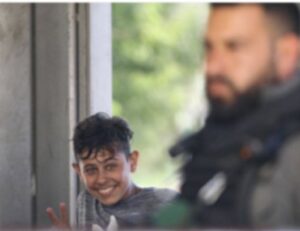 One suggested example to show solidarity suggests “reposting” a photograph of a smiling Palestinian child displaying a victory sign while allegedly being detained by an Israeli soldier. Teachers are instructed to make sure that students do not interpret this photo as representative of a happy Palestinian boy but rather as representative of malevolent Israeli actors. It is difficult to verify facts about where and when photos are taken and who is represented, particularly those photos alleged to represent a conflict or political view. Misattributing photos is a common device used by anti-Zionist propagandists. Shoman instructs teachers to have students post this image on social media in order to educate people about how Palestinian youth are being detained.7
One suggested example to show solidarity suggests “reposting” a photograph of a smiling Palestinian child displaying a victory sign while allegedly being detained by an Israeli soldier. Teachers are instructed to make sure that students do not interpret this photo as representative of a happy Palestinian boy but rather as representative of malevolent Israeli actors. It is difficult to verify facts about where and when photos are taken and who is represented, particularly those photos alleged to represent a conflict or political view. Misattributing photos is a common device used by anti-Zionist propagandists. Shoman instructs teachers to have students post this image on social media in order to educate people about how Palestinian youth are being detained.7
Teachers are warned to make sure the message is about the violence directed at Palestinians. Her instructions convey that the material should not be open for interpretation and that teachers should make sure that students receive a clear, uncomplicated message of Palestinian victims of aggression from Israeli colonizers.
Omitted from the presentation is the historic Jewish presence on the land (that long predates that of the Palestinian Arabs) and the legal right of the Jewish people to the land under international law. There is no discussion of historically and archeologically well-founded Jewish claims to be returning to their ancestral homeland. Nor are the decades of Palestinian terrorism that compel Israel’s ongoing and life-saving security measures ever mentioned. This simplistic treatment trains teachers to become uncritical propagandists and ignore authenticated facts.
Shoman routinely offers allegations without any supporting evidence. For example, in one webinar, she contended that Israel forces Palestinians to purchase provisions from Israeli stores, an absurd and false allegation. In another, she showed a map of the Middle East in which the name “Palestine” appears, and the State of Israel is missing from the map. Erasing Israel is a frequent tactic of indoctrination used by anti-Israel activists. It imparts the notion of Israel as illegitimate and its existence as artificial and transient.
Shoman’s presentations, however, are not unique. LESMCC educator sessions and literature provide no informed discussion of the complex issues relating to Israel and Palestinian Arabs. There is no indication, for example, of Israel’s Jews of Middle Eastern origin who are no different ethnically than the Arabs and who have suffered severe discrimination when they lived in Arab Muslim-dominated states. Instead, Israel is portrayed as a “colonizing white supremacist” state, despite the fact that approximately half of Israel’s Jews are from Arab countries.
LESMCC’s message is that students must express solidarity with Palestinians against Israel. Thus, whenever Israel is mentioned in LESMCC programs, it is always to reinforce the image of an oppressor and colonizer.
Exposure of LESMCC Agenda Elicits Backlash
LESMCC consultants have indicated that opposition to their anti-Israel message only hardened their view of Jewish communal organizations as their chief antagonists. During the 2022 educator summer institute a presenter recounted the history of the California ethnic studies bill AB101 and how their liberated curriculum was rejected by California’s Department of Education and the governor. Referring to the opposition to their version, Theresa Montaño stated without any evidence, “People [are] fearful to engage in acts of solidarity with those that are from Palestine.”8
Montaño asserted that the opposition to their version of the curriculum “cemented my solidarity for the Palestinian community” during a 2020 podcast. She did not provide any of the arguments posed by those who had opposed their version of the curriculum. This failure to provide any counterargument or encourage critical thinking is a cardinal feature of their pedagogy.
Connections Are Fabricated Among Oppressed Groups
LESMCC exploits the limited knowledge of the Israeli-Palestinian conflict among many American teachers and students. This allows them to present analogies that more knowledgeable individuals would recognize as absurd. As LESMCC’s Theresa Montaño explains “We even included a lesson plan on Palestine and Mexico because of the struggle in the Southwest and issues related to settler-colonialism.” The Palestinians are connected to African Americans, Latinx, and Native Americans through what is alleged to be a shared victimhood.
LESMCC especially seeks to condition students and teachers they designate as oppressed to feel an affinity for Palestinians as similarly oppressed and colonized. During many presentations, the consultants cite a concept from Mayan culture called “In Lak’ech” (“you are my other me”) to evoke intersectionality among groups of people they designate as oppressed. This fails to address the sharp distinctions between different oppressed groups’ experiences and circumstances.
Shoman again is situated at the center of efforts to elicit links to the Palestinians by emotional manipulation. In one session, she coaxes attendees:
Think about a time you have felt included or excluded in school or society based on who you are. We are going to talk about exclusion when you align yourself with Palestine.
She shows a slide with graphics linking Latinx and African American communities to Palestinians:
Tellingly, one of the pictures from the slide came from an Israel Apartheid week event on a university campus in 2017. She also tries to link the Palestinians to the Black Lives Matter movement. At a 2020 webinar jointly hosted by Xicanx Institute for Teaching and Organizing (XITO) and Teach Palestine, she analogizes societal problems in the United States and environmental problems at the US/Mexico border to the Palestinians predicament.
Images selected as she spoke promote analogies between the expulsion of the Cherokee Indians and the Palestinians:
Shoman added: “As areas were colonized and taken by force whether here or in Palestine, and people were expelled never to return, our histories and trajectories were being altered and continue to be today… Losing lands to create these borders and these walls.”
For Shoman, every example of dispossession or human rights abuse leads back to the Palestinians, her sole focus.
Shoman never discloses to teachers that the Palestinian Arabs were offered a state of their own on multiple occasions—in 1947, 1993, 2000 and 2008— and rejected every offer. Shoman tells her audience that The Wall (Israel’s Security Barrier) separates people from one another, but never discusses that it was constructed because of an unrelenting campaign of suicide bombing attacks by Palestinian Arabs from the West Bank that killed more than a thousand Israelis from 2000-2004.
LESMCC Partners with Other Anti-Israel Organizations
An educator workshop offered in November 2022 shows the organization has grown and partnered on multiple fronts with other groups, emphasizing the political propaganda about Palestinians. LESMCC consultant Samia Shoman, Anita Fernandez, an LESMCC collaborator from XITO, and Teach Palestine Project at the Middle East Children’s Alliance (MECA) author Jody Sokolower compare Hispanic immigrants at the US border to Palestinians:
Jody Sokolower expressed her intent to bring the Palestinians into K-12 classrooms during a 2022 Educators for Palestine summer series run by the extreme anti-Israel Democratic Socialists of America (DSA).9 The session description claims it “explores the very practical question of “How do I incorporate Palestine into my day-to-day lessons?” Sokolower told teachers:
If I was leading a class discussion, these are some of the questions I would ask students to think about. What do you think might be similar about Palestine and the United States? You are trying to pull out how settler colonialism is operating here, how settler colonialism is operating in Palestine, what does the resistance look like in both places.10
Lara Kiswani from the Arab Organizing Center AROC also presented during the same DSA session with Sokolower. Kiswani is a longtime professional anti-Israel activist, and not a scholar or academic with K-12 curriculum development expertise. She has become increasingly visible as a figure in LESMCC anti-Israel sessions and meetings.
She gave a presentation at the DSA program with Sokolower in which she stated:11
Today, we are focusing in on Jerusalem and we will be using Silwan, a Palestinian village in east Jerusalem and part of east south Jerusalem, to connect to what people are facing in the classroom.
During the workshop, Kiswani connected the United States and Israel:
Israel actually used the US playbook to colonize Palestine, so they specifically said we learned from what the United States did to the indigenous people in this land in order to implement their strategy in Palestine… United States and Israel are sharing tools and tactics because it’s actually beneficial to them, they are learning from each other… it is about exploitation, indigenous people, working people, the average person trying to fight for a dignified life and those committed to occupying, displacing and making profit off that land and those people… Really it is about race and power and class.12
Her rhetoric evokes emotion that is empty of any factual content. Her purpose is to inject Palestine into every aspect of the ethnic studies movement. She proclaims,
Today, it is very simple and easy to bring racial justice into the classroom, because the movement for black lives, indigenous land defenders, have made it a priority and demanded that change and actually advanced that struggle here in this country. It made it so that we can’t ignore policing… and we can’t ignore what is happening in their world. And they have expressed their solidarity with Palestine… You can’t not talk about Palestine if you are talking about social justice and racial justice… or policing and militarism.13
This sort of repetition of falsehoods and total omission of contrary arguments and facts is a hallmark of indoctrination – not critical thinking.
Conclusion
LESMCC educator sessions and literature provide no discussion or research on the history and contemporary facts relating to Israel and Palestinians. There is no discussion of why students should express solidarity with Palestinians. It is simply asserted. Their intense focus on the Palestinian cause and vilification of Israel reflects the increasing influence of anti-Israel BDS activists in the liberated ethnic studies movement.
When considering the vast mosaic of American ethnic groups, the Palestinians represent a tiny fraction. The elevation of their cause within American ethnic studies represents a victory of political activists who seek to hijack American education for the purpose of promoting a foreign conflict over the academic goal of teaching today’s increasingly diverse American population about American ethnic groups.
In Liberated Ethnic Studies Model Curriculum Consortium workshops and institutes, teachers are repeatedly encouraged to inject anti-Israel material into their K-12 classrooms and to teach political activism to promote these themes more broadly. If these breaches of academic integrity and the norms of classroom conduct by teachers are allowed to go unchecked and unchallenged, falsehoods demonizing the Jewish state may shape the views of a new generation of Americans to the detriment of all.
Footnotes
- LESMCC Summer 2022 Educator Institute
- Ibid.
- Ibid.
- Ibid.
- Ibid.
- LESMCC Summer 2021 Educator Institute
- Ibid.
- LESMCC Summer 2022 Educator Institute
- DSA – Palestine Summer 2022
- Ibid.
- Ibid.
- Ibid.
- Ibid.

